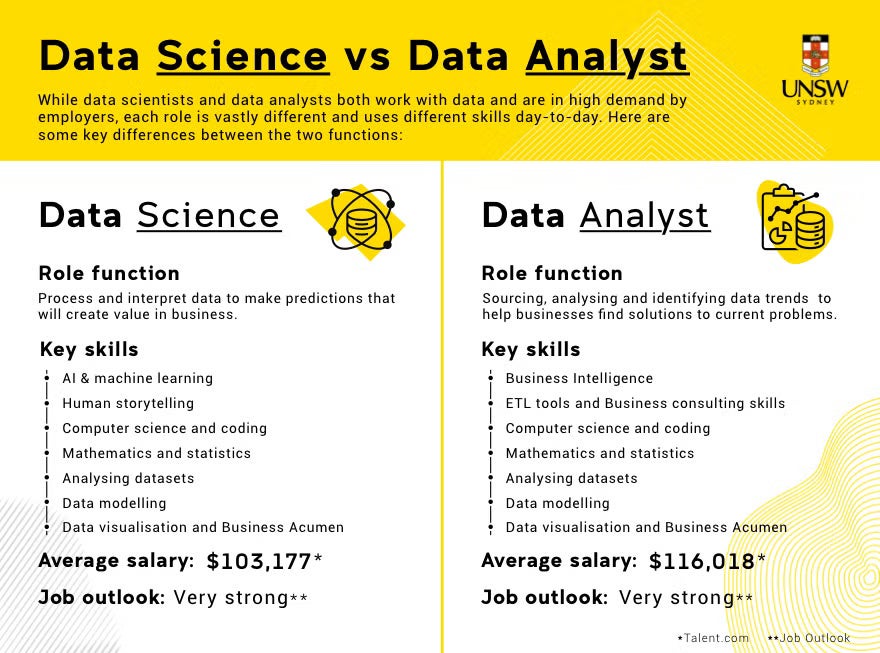Business analytics emerged as a discipline shortly after Microsoft introduced Excel in 1985, enabling businesses to collect and coordinate much more information than ever before. Over the next thirty years, data analytics grew and evolved to become an integral part of modern business operations. Now data science is looking to the future and enabling businesses to create value from data.
So, is a data scientist just an upgraded data analyst? While they do have similar core skills, these two roles are quite different, and each is in high demand.
Common core skills of a data scientist vs data analyst
It’s fair to say that these two roles are often confused for each other, even by employers and recruiters. While this is partly due to the relatively young industry of data, it’s also true that the core skills of both a data scientist and an analyst are very similar.
Computer science and coding
At the heart of both roles is a passion for computer science and coding.
In this area, data scientists and analysts require a number of key skills, as follows:
- Data munging/data wrangling: This skill involves the ability to organise data into a useful form that can be used for analytics.
- Familiarity with analytics: Both data scientists and analysts need to be familiar with analytics languages, such as R, SAS, Python and Structured Query Language (SQL). They use these languages to talk to and understand databases.
Mathematics and statistics
Many find their way to the field of data science or analytics through a proficiency for mathematics or statistics.
A knowledge of computer science helps both data analysts and data scientists organise and process data. But a knowledge of mathematics and statistics can take that analysis one step further. Mathematical and statistical skills help analysts in the following tasks:
- Interpreting visual data representations
- Identifying meaningful patterns in data
- Understanding key performance indicators
Analysing datasets
With the vast amounts of data available today, a critical skill for data scientists and analysts is the ability to analyse raw data.
Expertise in analysing datasets enables data scientists and analysts to:
- Manipulate raw data in meaningful ways
- Uncover useful insights in the data
- Draw conclusions, so they are able to organise, transform and model datasets
Data modelling
At later points in the data analysis process, data scientists and analysts alike have to create representations of the information systems they have created. For this reason, the ability to model data is an essential skill.
Data modelling enables data scientists and analysts to:
- Visually represent their systems to various stakeholders
- Communicate connections between data points and structures
- Show how users will interact with systems, for example, the interaction between products, vendors and customers within a system
Data visualisation
Data analysts and data scientists are regularly called on to make sense of and recognise meaningful patterns in data, so the skill of data visualisation is important. Data visualisation enables data scientists and analysts to communicate data visually, which can be particularly helpful in cases in which data is numerous, for example, in a time series.
Specifically, data visualisation skills enable data scientists and analysts to:
- Represent data in such a way that business users can gain greater insight into it
- Recognise patterns in their data
- Make sense of patterns and discover any red flags
Business acumen
One key skill that brings other core skills together and really makes the data sing is business acumen. Business acumen skills help data scientists and analysts to:
- Understand how data impacts key business decisions that affect profitability
- Know how to filter and decode complex data into relevant information
- Understand how to communicate with key stakeholders
While common to both roles, these abilities will be applied differently in each field of expertise.
The unique qualities of a data analyst
Specialising as either a data analyst or data scientist also demands some unique qualities that can be extremely valuable for businesses.
Data analysis is objective and characterised by the intention to report relevant information with impartiality. When answering questions asked by business teams, the analyst strives to eliminate bias in processing data for that purpose. On the other hand, data interpretation is subjective and influenced by the worldview of the data scientist. They take processed data and rely on their advanced business acumen to make predictions that will create value in business.
Due to the objective nature of the work performed by data analysts, they need to possess a number of unique qualities.
Business Intelligence (BI)
An Analyst isn’t expected to build statistical models in the business setting but will more likely use Business Intelligence (BI) software to retrieve, analyse, transform, and report data. These software applications include data management tools, data discovery operations and reporting tools.
ETL tools
A large part of the role is to manage data warehousing with a focus on the extract, transform and load (ETL) process. This process brings data together from different sources, transforms it into something different from those sources, and then loads it into one unified data warehouse.
Analysts must possess a number of unique skills that will enable them to best utilise ETL tools. These include the following:
- Familiarity with ETL tools. A number of different tools are available, and analysts must be familiar with them.
- Familiarity with BI software. They will need to use this to retrieve, analyse, transform and report data. These software applications include tools for data management, data discovery and reporting.
- The ability to use ETL tools to provide useful business insights based on the quality of data (not just on the quantity of it).
Business consulting skills
Another key difference between data analysts and data scientists is that often, analysts often operate as business consultants, working for a variety of organisations. Therefore, analysts usually require consulting skills.
The unique qualities of a data scientist
According to a report by the Australian Mathematical Sciences Institute and the Statistical Society of Australia, the demand for data scientists is rapidly growing in Australia. In a single month, there were more than 5,000 job openings related to data science and the projected annual growth rate for data science jobs is 2.4 per cent, which exceeds the average growth rate of other professions by 1 per cent.
Data Scientists are in a unique position where they are not expected to know the answers – they are expected to know the questions to ask! Rather than knowing how to get things done, the Data Scientist is the one who has to figure that out. So, this is a role that suits people who really like to solve puzzles.
Machine learning
One area where data scientists specialise is machine learning, which leads to the common misconception that machines learn. Machine learning is similar to computational statistics, which uses statistics to make predictions using computers and algorithms.
Specific skills that data scientists need to possess when it comes to machine learning include the ability to:
- Program algorithms to help predict answers for new observations
- Supervise the machine learning process to ensure that the desired response is delivered
Storytelling through data
In addition to familiarity with a wide range of computer languages, human storytelling skills are also important in data science. Data scientists report to senior management and board members who are often less computer literate.
The specific skills data scientists need when it comes to storytelling through data include the ability to:
- Translate data into a business story
- Create a business story that enables managers and teams to develop plans that can be put into action
While the best data scientists excel in business acumen, computer science, coding, mathematics and statistics, the true unicorn can do all that and put the results into words.
Data scientists are more likely to be employed on staff, or in specialist teams, rather than as a business consultant.
Data scientist vs data analyst skills
| Skills | Data Scientist | Data Analyst |
|---|---|---|
| Computer science and coding | ✔ | ✔ |
| Data munging/data wrangling | ✔ | ✔ |
| R | ✔ | ✔ |
| SAS | ✔ | ✔ |
| Python | ✔ | ✔ |
| SQL | ✔ | ✔ |
| Structured query | ✔ | ✔ |
| Mathematics/Statistics | ✔ | ✔ |
| Business acumen | ✔ | ✔ |
| Business Intelligence (BI) | ✔ | |
| AI & machine learning | ✔ | |
| Data visualisation | ✔ | ✔ |
| Human storytelling | ✔ |
Data analyst vs data scientist: Differences in salary, job outlook and educational requirements
While the skills required for a data analyst and a data scientist may differ, both jobs are in high demand and offer excellent prospects for those who want to enter the respective fields.
Refer to the following discussion for salary information, job outlook and educational requirements for each role.
Data analyst
- Average salary: According to Talent.com, the median salary for a data analyst in Australia is $103,177 as of 2022.
- Job outlook: According to the Australian government website Job Outlook, the prospects for data analysts in the future are classified as very strong (the highest possible rating).
- Educational requirements: To work as a data analyst, graduates will need an undergraduate or a master’s degree in mathematics, statistics, computer science, information management, finance or economics.
Data scientist
- Average salary: According to Talent.com, the median salary for a data scientist in Australia is $116,018 as of 2022.
- Job outlook: According to the Australian government website Job Outlook, the prospects for data scientists in the future are classified as very strong (the highest possible rating).
- Educational requirements: In order to work as a data analyst, graduates will need an undergraduate or a master’s degree in computer science, information technology, mathematics, physics or statistics.
The value of specialisation
Data scientists and data analysts are in high demand. Where big data was once the privilege of large companies like Google and Facebook, businesses of all sizes are now collecting their own data. The sheer volume of data currently overwhelms the number of specialists available to scrutinise and convert it into useful information.
Interested in starting a career in data science or analytics?
UNSW Online offers professionals from a wide variety of backgrounds an opportunity to upgrade their qualifications to specialise in data science or analytics. The Master of Data Science and the Master of Analytics have been designed for graduates from undergraduate courses in IT, engineering, maths, statistics and several other disciplines.
Both programs are delivered 100% online, providing flexibility and accelerated study pathways that enable you to graduate in as little as two years without interrupting your career. The Master of Data Science equips you with highly sought-after expertise in statistics, programming and machine learning, enabling you to tackle complex data challenges and lead projects with confidence.
With the Master of Analytics, you'll gain advanced skills in data-driven decision-making, helping you influence critical business strategies and unlock new career opportunities. Choose specialisations in General Analytics, Human Resource Analytics, or Marketing Analytics to tailor your studies to your goals and interests.
Are you ready to take the next step towards a thriving career in data science or analytics? Visit our website today or reach out to our enrolment team at 1300 974 990 to discover how UNSW Online can help you lead in the world of data.






